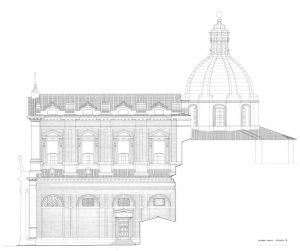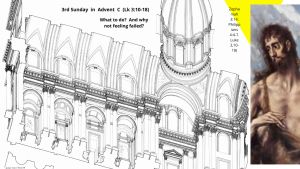
don Giuseppe Nespeca
Giuseppe Nespeca è architetto e sacerdote. Cultore della Sacra scrittura è autore della raccolta "Due Fuochi due Vie - Religione e Fede, Vangeli e Tao"; coautore del libro "Dialogo e Solstizio".
Wedding at Cana: between water and wine... desolation or love
COMPLEXITIES OF EXISTENCE (by Francesco Giovannozzi, psychologist and psychotherapist)
The complexities of existence.
Life is not always easy and the complexities of existence have always existed; they accompany us along the path of our daily lives.
In times gone by, it was often the family doctor who listened to them and associated them as related to the health of his patients and gave them advice.
When, on the other hand, the difficulties were of an ethical nature, people turned to the priest who, through accompaniment and confession, gave suggestions on how to redeem themselves.
Later, with the discovery of psychology in its various forms, people became concerned with human problems. The figure of the psychologist in the broad sense or the psychiatrist joined the previous figures. As far as the field of the psychiatrist is concerned more specifically, the problems are not visible illnesses.
People who are afflicted by life complications are not patients in the usual sense. They can be normal, productive people - as normal as one can be in our community.
Generally, these daily contrarieties may concern interpersonal relationships, the way one works, performance issues... but also the issue of living honestly, in line with one's principles and personal beliefs. Then there are the contrarieties of practical life, which can often accentuate the others.
A lot also depends on our typical behaviours with which we defend ourselves or construct our way of life, and which were formed at an early period - unconsciously imitating people who had meaning in our lives (the so-called character, very succinctly).
Jung argues that the child's unconscious depends on the parental unconscious.
Almost always in my long professional practice I encountered this construct, and I had to struggle to make people understand that it was the parents who triggered the behaviour.
Often when I encountered parents who did not want to accept certain responsibilities, the latter would resort to excuses that did not hold up in any way.
In relationships between individuals, the most annoying issue concerns how we experience our affections.
There are aggressive people who seek people to dominate. There are those who exploit the other (the unwary); and so on.
In love relationships, one has to pay attention to how each one stands towards the other. Let us give some examples.
A woman who suffers because of her spouse who hinders her every development (or vice versa) must understand or be helped to understand that she has somehow sought this situation, and that it is only by finding confidence in her own possibilities and ability to manage herself that she will find relief from her pains.
Otherwise, i.e. if he does not discover his own potential, not even by separating will he solve his problems - because he will unconsciously seek the same kind of spouse.
Only people who are able to respect each other's needs and interests are capable of adult love. We often confuse our own desire with that of the other.
How many times in counselling with couples have I encountered this.
In job difficulties we often find people who move from one job to another because they are not satisfied with the lack of recognition. It may be, for example, an individual with grandiose ideas about his or her aptitudes who has to seek admiration in the work environment .
Then there are people who do creative work and feel that they do not produce as they would like. Here we are often faced with an unachievable perfectionism. Often such individuals are unable to admit that they have limits, and are confronted with their real capabilities.
It then happens that many people turn to an analyst because although they do not have a form of depression, they are not happy with themselves.
In his Psychoanalysis of Contemporary Society, Erich Fromm argues that consumerism leads us to an 'alienation from self'. By 'alienation' he means that which in principle belongs to man and then becomes foreign to him - eventually dominating us.
We must be as others want us to be.
Advertising and fashion itself also consciously influence us, and in this way if we do not conform we can feel backward.
We often get into conflict between our beliefs and the need to 'please' people.
Of course we do not have to be isolationists, but even here a proper balance 'saves' us, since repudiating certain fundamental tenets of our way of being does a lot of damage.
May the coming Christmas enlighten us, show us the way. Not infrequently, here too, we match current population trends, and often forget its true meaning.
Francesco Giovannozzi Psychologist-psychotherapist
Familiarity at the human level makes it difficult to go beyond this in order to be open to the divine dimension. That this son of a carpenter was the Son of God was hard for them to believe. Jesus actually takes as an example the experience of the prophets of Israel, who in their own homeland were an object of contempt, and identifies himself with them (Pope Benedict)
La familiarità sul piano umano rende difficile andare al di là e aprirsi alla dimensione divina. Che questo Figlio di un falegname sia Figlio di Dio è difficile crederlo per loro. Gesù stesso porta come esempio l’esperienza dei profeti d’Israele, che proprio nella loro patria erano stati oggetto di disprezzo, e si identifica con essi (Papa Benedetto)
These two episodes — a healing and a resurrection — share one core: faith. The message is clear, and it can be summed up in one question: do we believe that Jesus can heal us and can raise us from the dead? The entire Gospel is written in the light of this faith: Jesus is risen, He has conquered death, and by his victory we too will rise again. This faith, which for the first Christians was sure, can tarnish and become uncertain… (Pope Francis)
These two episodes — a healing and a resurrection — share one core: faith. The message is clear, and it can be summed up in one question: do we believe that Jesus can heal us and can raise us from the dead? The entire Gospel is written in the light of this faith: Jesus is risen, He has conquered death, and by his victory we too will rise again. This faith, which for the first Christians was sure, can tarnish and become uncertain… (Pope Francis)
The ability to be amazed at things around us promotes religious experience and makes the encounter with the Lord more fruitful. On the contrary, the inability to marvel makes us indifferent and widens the gap between the journey of faith and daily life (Pope Francis)
La capacità di stupirsi delle cose che ci circondano favorisce l’esperienza religiosa e rende fecondo l’incontro con il Signore. Al contrario, l’incapacità di stupirci rende indifferenti e allarga le distanze tra il cammino di fede e la vita di ogni giorno (Papa Francesco)
An ancient hermit says: “The Beatitudes are gifts of God and we must say a great ‘thank you’ to him for them and for the rewards that derive from them, namely the Kingdom of God in the century to come and consolation here; the fullness of every good and mercy on God’s part … once we have become images of Christ on earth” (Peter of Damascus) [Pope Benedict]
Afferma un antico eremita: «Le Beatitudini sono doni di Dio, e dobbiamo rendergli grandi grazie per esse e per le ricompense che ne derivano, cioè il Regno dei Cieli nel secolo futuro, la consolazione qui, la pienezza di ogni bene e misericordia da parte di Dio … una volta che si sia divenuti immagine del Cristo sulla terra» (Pietro di Damasco) [Papa Benedetto]
And quite often we too, beaten by the trials of life, have cried out to the Lord: “Why do you remain silent and do nothing for me?”. Especially when it seems we are sinking, because love or the project in which we had laid great hopes disappears (Pope Francis)
E tante volte anche noi, assaliti dalle prove della vita, abbiamo gridato al Signore: “Perché resti in silenzio e non fai nulla per me?”. Soprattutto quando ci sembra di affondare, perché l’amore o il progetto nel quale avevamo riposto grandi speranze svanisce (Papa Francesco)
The Kingdom of God grows here on earth, in the history of humanity, by virtue of an initial sowing, that is, of a foundation, which comes from God, and of a mysterious work of God himself (John Paul II)
duevie.art
don Giuseppe Nespeca
Tel. 333-1329741
Disclaimer
Questo blog non rappresenta una testata giornalistica in quanto viene aggiornato senza alcuna periodicità. Non può pertanto considerarsi un prodotto editoriale ai sensi della legge N°62 del 07/03/2001.
Le immagini sono tratte da internet, ma se il loro uso violasse diritti d'autore, lo si comunichi all'autore del blog che provvederà alla loro pronta rimozione.
L'autore dichiara di non essere responsabile dei commenti lasciati nei post. Eventuali commenti dei lettori, lesivi dell'immagine o dell'onorabilità di persone terze, il cui contenuto fosse ritenuto non idoneo alla pubblicazione verranno insindacabilmente rimossi.



















